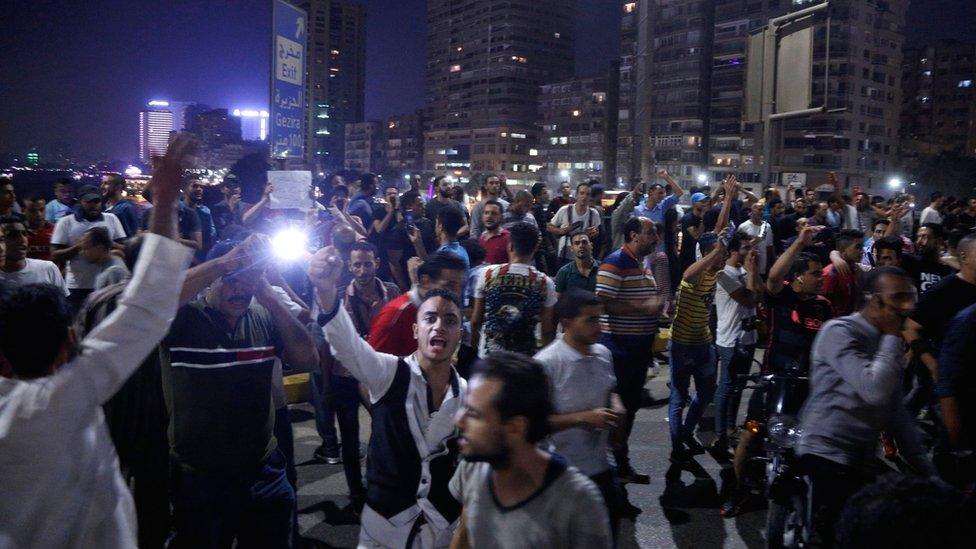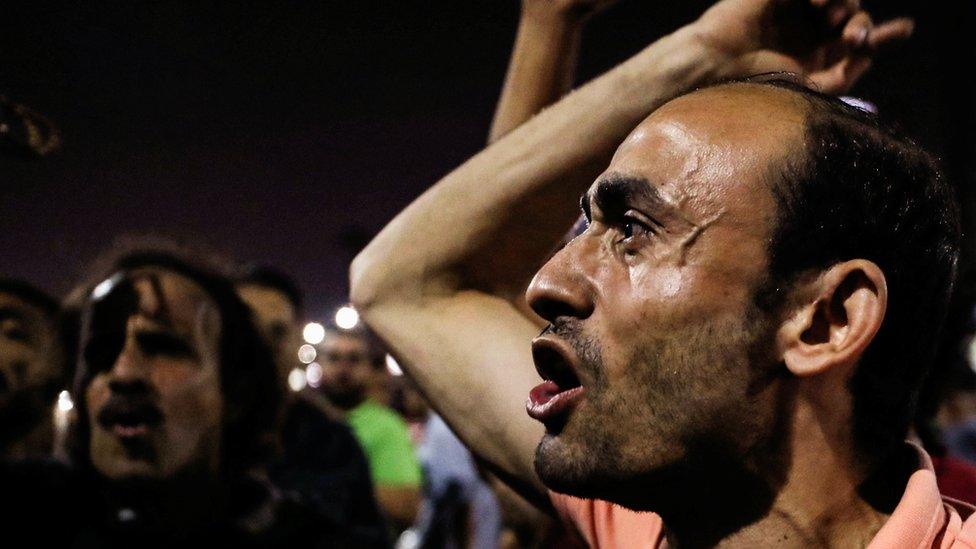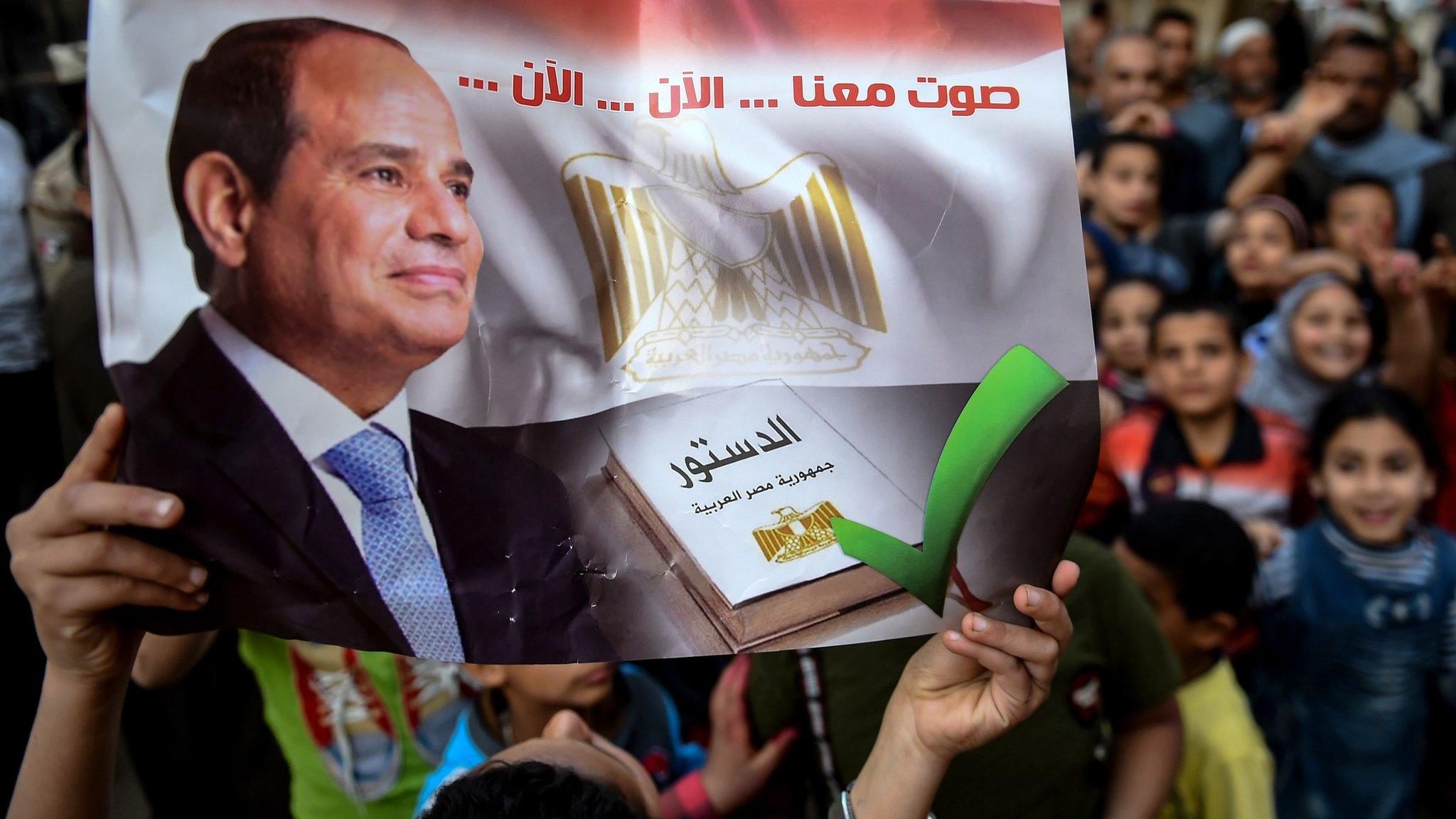Mohamed Ali: The self-exiled Egyptian sparking protests at home
- Published
Watch how one man's videos have stirred rare protests in Egypt
When hundreds of Egyptians took to the streets calling for President Abdul Fattah al-Sisi's removal in several cities in Egypt on Friday, it came as a surprise to most observers.
But one man, Mohamed Ali, expected the protests and can effectively be credited with setting them off.
In a matter of weeks, the 45-year-old businessman has become a household name in Egypt, emerging as one of the most vocal critics of the president after a crackdown in recent years that has largely silenced dissent.
Since early September, Mr Ali has been posting almost daily videos from his self-imposed exile in Spain, accusing President Sisi and the military top brass of corruption.
His videos have triggered a series of hashtags on social media that have reflected the growing anger among Egyptians, culminating in the protests over the weekend.
The BBC's Sally Nabil says protesters in Cairo's Tahrir Square were undaunted
The extent of Mr Ali's popularity prompted Mr Sisi himself to respond to the accusations, dismissing them as "lies and slander" and rebuking Egyptians for watching the videos.
In response to Mr Sisi's statements, Mr Ali vowed to topple him.
Who is Mohamed Ali?
The former owner of a private contracting business, named Amlaak, Mohamed Ali has a history of working on projects for the Egyptian military.
He is also known for having briefly pursued a career as an actor - with credits including the little-known, but somewhat acclaimed film The Other Land - before liquidating his assets and moving to Spain.

Hundreds of protesters filled Tahrir Square on Friday
His popularity skyrocketed following the release of a series of videos in which he claimed to have insider information about the Egyptian military's mishandling of state funds.
His father, Ali Abdul Khalek, was a national weightlifting champion before he launched his family contracting businesses for himself and his sons, including Mohamed.
In an interview with pro-government TV presenter Ahmed Moussa, Abdul Khalek appeared to disown his son and sought to discredit his allegations, saying his family owed their fortunes to the armed forces.
What does he allege?
Mr Ali claims to be owed millions of Egyptian pounds in unpaid dues from the military and says he had fled the country over fears of "retaliation" from the authorities after he challenged the armed forces.
His familiarity with the armed forces' building projects through his work with them lent him credibility among Egyptian audiences, with many hailing him as a whistleblower.

Mr Ali's videos have resonated with many Egyptians
He has also accused Mr Sisi of squandering state funds to build presidential palaces and villas, and claimed that projects were being undertaken as favours to generals in his close circle.
He has continued to escalate his tone against Mr Sisi, while at times pointing out that not all army officers are corrupt.
In his more recent videos, he demanded that Minister of Defence Mohamed Zaki arrest the president, and separately claimed he had received messages of support from army and police officers.
Since the release of the videos, a lawyer has accused Mr Ali of "high treason" and he has faced criticism on traditional media outlets.
Why did Egyptians heed his call?
Mr Ali's allegations over the mishandling of funds appear to have struck a chord with many Egyptians who have grown increasingly disaffected by ongoing austerity measures.
In July, official state figures revealed that 32.5% of Egyptians were now living in poverty, up from 27.8% in 2015.
Yet, in spite of the economic pressures, the prospect of protests remained unlikely, due to widespread protest fatigue and harsh repercussions for any displays of opposition.
But to the surprise of many, small-scale protests broke out in and around Cairo's iconic Tahrir Square and other cities, breaking a barrier of fear that was built during Mr Sisi's years in power.
Allow X content?
This article contains content provided by X. We ask for your permission before anything is loaded, as they may be using cookies and other technologies. You may want to read X’s cookie policy, external and privacy policy, external before accepting. To view this content choose ‘accept and continue’.
Mr Ali's combination of proclaimed insider knowledge and his populist rhetoric and vernacular set him apart from both the Islamist opposition and secular political activists, whose demands have often focused on rights rather than economic gains for citizens.
Moreover, Mr Ali sought to reassure Egyptians that they would be safe if they protested amid celebrations for a football match on the same day, which may have contributed in part to encouraging the demonstrations.
As it happened, hundreds were reportedly arrested after protesters took to the streets.
Prior to Mr Ali's appearance on the scene, anger had already been mounting in the country due to economic reforms which have strained the people. These included the flotation of the Egyptian pound in 2016 which caused it to shed over half its value and dramatically increased the prices of goods.
Mr Sisi has steadfastly defended the austerity measures as necessary, saying they would yield results later. In speeches, he has said "we [Egyptians] are very poor" and called on Egyptians to donate spare change to his Long Live Egypt fund.
Yet, despite denying Mr Ali's allegations of corruption, Mr Sisi has remained resolute in his response to the videos, acknowledging the construction of palaces and saying he would continue doing so "for Egypt".
This confirmation from Mr Sisi that millions have indeed been spent on palaces and other projects, coupled with Mr Ali's sharp response, was enough to push a small minority over the edge to take their anger to the streets.
- Published21 September 2019

- Published22 September 2019

- Published24 April 2019
